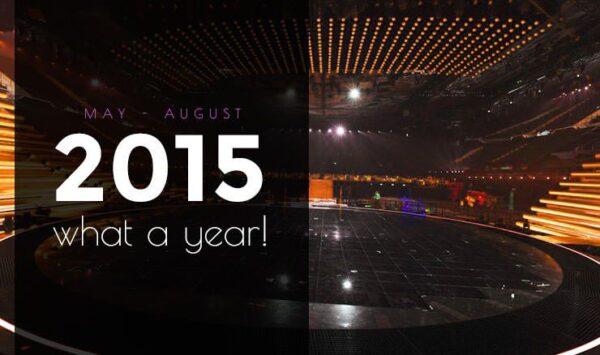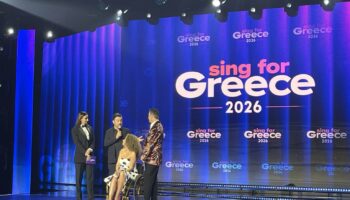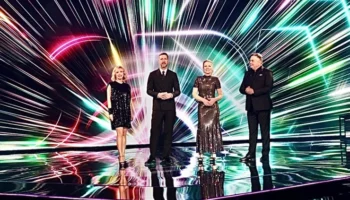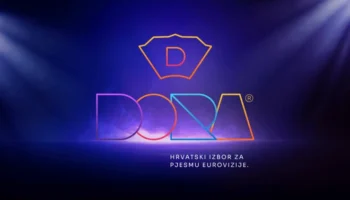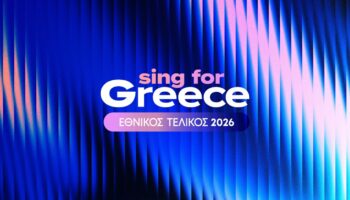In a roundup of the Eurovision year, May is the icing on the cake, the high holiday season of the Eurovision Song Contest. It’s the time when even the most part-time Eurovision supporters get switched on like a lightbulb.
And this year, the month saw Vienna greeting the first of the year’s artists for rehearsals, a mammoth process that has grown exponentially more complex since the city first hosted the contest back in 1967. It was a longer gap between successive hostings than any other country in Eurovision history, and wow, how the contest had changed in that time.
One huge change had happened this very year. Notably, Australia was welcomed as a competitor for the very first time, with Guy Sebastian representing the country in (what was originally billed as) as one-off special ‘gift’ to Australian fans. We also saw the return of the orchestra (though not for the main performances).
It did not go unnoticed that Austria’s first winner, Udo Jürgens, was painfully absent after his death at the end of 2015. ÖRF paid a touching tribute to him in the show, ensuring that the line between the contest’s past and present remained unbroken.
Nearly 200 million tuned in to watch the show, which was infused with Austrian grandeur in the sumptuous surroundings of the Wiener Stadthalle. And, despite the odd scandal – and where would Eurovision be without those? – it was Sweden’s Måns who emerged from this year’s contest in glorious triumph after one of the more exciting contests of recent years. The voting saw a close race between the top three until almost the very end, with the kind of front-runner swap-round that is rarely seen in contemporary contests. The results also saw debutant Australia in a very strong fifth place, and Latvia back in the top ten for the first time in many years. If you’d been following the bookmakers before the contest, you might well call 2015 the most predictable contest yet, however, as the combined bookmakers’ odds correctly predicted the entire top 5.
Måns’ win was a popular one with the music-loving public, hitting the charts across the continent, with several other artists joining him. However, Måns wasn’t given a completely free ride with all fans, thanks to the release of the televoting figures by the EBU. For the first time in the televoting-jury split era, the winner of the televote did not tally with the jury winner; fans of Italy’s entry were at once vindicated and disappointed to find out that their three boys had won the hearts of the voting public on the night of the final, whereas Måns had topped the professional vote. The contest just wouldn’t be the same without the number-crunchers and statistical debates, so it’s encouraging to see an old family tradition continue!
We Are the Zeroes of Our Time
Eurovision is not all about the winners, though, but about stoicism in the face of adversity and bad luck. This year, that spirit was epitomised by Ann Sophie, one of the two acts to share the feared ‘nil points’ in 2015, who came back with the perfect response to the zero.
Of course, she was not alone, but shared the unhappy prize with the hosts, represented by The Makemakes. In another first, poor Austria became the only host country ever to score nil points, and the first since the Netherlands in 1958 to come last on the scoreboard.
Conchita’s Continued Rise
May was also the month of Conchita, Austria’s 2014 winner, who continued to lend a huge portion of glamour and showbiz to proceedings. Her eponymous album was cleverly released within a week of the 2015 contest, and she wowed us all at the Wiener Stadthalle with her second single “You Are Unstoppable”, taken from that release, passing on the Eurovision baton in real style. And the public continued to adore her, lifting her high into the home charts.
Where next?
The glitter was still falling in June, and fans could feel the afterglow of the contest through such curiosities as Austria’s Måns stamps. The pace didn’t drop for a second for the winning country, either, as several cities leapt in with offers to host the 2016 event. SVT wasn’t short of offers, as Goteborg, Linköping, Malmö, Örnsköldsvik, Sandviken and – of course – Stockholm (with several alternative scenarios) all threw their hats into the ring, and the battle of the bids commenced. In the end, the contest would end up going back to its 2000 home at the capital’s Globen arena, but not without some spirited and popular presentations from its rivals.
Back to business
Of course, after the event, it’s back to business for artists recent and less so. The months following the contest saw a spate of releases for several Eurovision stars, including Måns’ own album Perfectly Damaged, which went big back home in Sweden. Amongst his 2015 competitors, Nina Sublatti continued her punchy, contemporary style with “Locked Box” whilst Monika Linkytė went solo with “Po dangum”. Even the Austrian representatives bounced back after their no-score disappointment with the single “Little is Much More”. Time never stops for representatives of previous contests, either, and other notable releases of these months included Jessy Matador’s Summer hit “Venga”, and Harel Skaat’s “Hollow”.
Sad farewells
But these months saw their share of sadness, too. Fans paused to reminisce as we said goodbye to Jaime Morey (Spain 1972), who sadly passed away in July, and Matia Bazar member Giancarlo Golzi (Italy 1979), who passed on in August. Artists Betty Missiego (Spain 1979) and Françoise Hardy (Monaco 1963) also made the decision to step back from show business.
Of course, the contest has always lived by that old adage that “The Show Must Go On”, and so it does; already, by the end of August, there were the first rumblings of preparations for the 2016 season. Already, many countries had already confirmed their participations, and the first rumours had begun to circulate about possible names and faces for the next round of national selections. May – August 2015 is crystallised in the annals of Eurovision history now, archived away in readiness for the next episode; we look forward to it!
